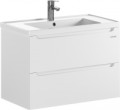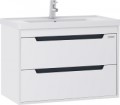Washbasin shape
This point refers to the external shape of the washbasin. First of all, the choice for this parameter depends on aesthetic preferences and design requirements. In practice, the differences between the different forms are essentially only that the presence of corners makes cleaning the washbasin somewhat more difficult - but not so much that this can be called a key point.
Traditional varieties of shapes are
round,
semicircular,
oval,
rectangular. In the latter case, there are variations on the theme of
a rectangular shape with an arc(in general, the body of the washbasin has right angles, but the front segment of its bowl acts as a characteristic semicircle - an arc) and
a rectangular shape with beveled corners(the corners of the body of such washbasins are made not at 90°, but in the form of curves). A separate line can highlight
the barrel-shaped shape - such models have curved sides that form a rounded and smooth shape, like a classic barrel.
Washbasin installation
—
Invoice for the cabinet. Washbasins designed to be installed directly on the cabinet. Their key advantage is ease of installation, especially compared to hanging models. Note that the design features of such models somewhat limit the variety of shapes.
— Suspended. Washbasins designed for wall mounting. Such models take up minimal space, but are quite difficult to install, because... require installation of appropriate wall mounts.
—
Overlay on the tabletop. A type of overhead washbasin designed for installation on a countertop. In many ways they are similar to the overhead models on the cabinet (see above), but are even easier to install. In addition, such washbasins can have almost any shape.
Washbasin material
- Ceramics. The most common material for modern sinks. Today, ceramic washbasins are made from: porcelain and earthenware. Porcelain has good strength, but is difficult to manufacture, making it quite expensive and relatively rare. Earthenware is a little less durable, but at the same time it costs less and looks no worse, which is why it has become widespread.
- Sanitary porcelain. Sanitary porcelain is considered a fairly advanced material: it is not inclined to absorb dirt, which is why it has a longer service life. In addition, the strength and reliability of this material are also quite high. Its main drawback is its rather high cost.
- Fake diamond. Most often, this term refers to cast marble - a composite material based on marble or quartz chips filled with polyester resin and dyes. The main advantage of artificial stone is its strength: it is perhaps the most impact-resistant material used in modern sinks. Plus it looks very good and is easy to clean. However, such washbasins are quite expensive.
- Glass. Glass can be classified as a premium material: it looks elegant, at the same time very original, making it well suited to various interiors, incl. and non-standard. The main disadvantage of glass is its fragility: it is somewhat less resistant to damage than the materials described above and requires careful handling. This is especially true for heavy objects - they should never be dropped onto glass sinks.

